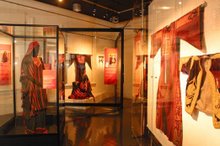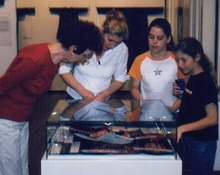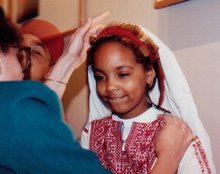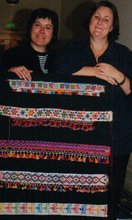 Libyan woman from Cyrenaica, c1925
Libyan woman from Cyrenaica, c1925
www.janzour.com
We often receive reference enquiries regarding the valuation of textiles. We advise people that we don't usually undertaken valuations but we can provide a valuation assessment, which provides an insurance company with cultural identification, date, conditional report and a comparison of the textile with similar items held in other museums.
Sometimes we can't help very much, but we invariably enjoy the exchange that results, and often acquire new friends (as well as new Archive Friends!). Here's an example of one dialogue resulting from a valuation request. A while back, we received the following message from a North American woman, Romie:
"Hello, I am considering purchasing a piece of Libyan bridal cloth & need to know how one goes about "valuing it." Here is a link to its description & photos on my web site. Thank you"
Our research officer was away, and so was our director, whose reply gives an indication of the kind of info we need with these enquiries:
"Thank you for your research enquiry to the Palestine Costume Archive regarding your proposed Libyan textile acquisition.
"Unfortunately you’ve actually caught us in transit at the moment, away from our research library, so could we just double check how quickly you need a response on this? And do you need cultural info / dating as well as a valuation assessment?
"If you need everything quickly we will refer you to another couple of museums who acquire Middle Eastern textiles and might be able to help, but if you can wait until we can access our research library and archives in a couple of weeks we can certainly try to help you then. This piece is unfamiliar to us, so we’d certainly enjoy learning more about it! Has the seller provided any details at all?
Romie responded:
"Thank you for such a prompt & considerate response. The young lady who owns the piece is wanting to sell it immediately, as she has just had a baby & family visiting from Libya in two weeks. She wishes to, according to cultural tradition, give gifts to her visiting family upon their arrival, and needs to sell the cloth in order to have the funds to do so. She wants $***.00 for it. Here is all the info she's given me:
"I have an exquisite piece of material that is fully hand embroidered with beads and sequin.. very heavy and very unique.. I bought it in Libya (North Africa)......It's a traditional cultural piece that is used as clothing for Libyan brides.
"Regarding the fabric ... it really is glorious ... I actually got it from Libya two years ago ... I took it in to a frame store in Chicago to be framed (turned out to be too expensive for us) and they all went nuts over it. The owner said .. it is very original, and ... he has never seen or heard of anything like it. You are more than welcome to do as much research as you like, but I know for sure you won't find much... "
"She was right about not being able to find much info! While it would be nice to eventually have cultural info / dating as well as a valuation assessment, I think I'll go ahead and acquire it now, as it is truly an absolutely spectacular piece of art. Surely it is worth at least she wants..."
To be quite honest we could hardly help at all in this case - we couldn't "find much" either, lol - other than to provide some basic background on North African / Libyan dress. But we agreed with Romie about the price. We also were intrigued by our conversations with Romie. The idea of acquiring the Libyan wedding textile was taking her on an unexpected journey:
"it seems to me that other cultures have such wonderful traditions & create absolutely beautiful artwork based on their belief systems, as opposed to American "culture" where I feel we really have no "traditions of our own" ...
"Thanks again for your help. I will take more photos once I get it home & displayed. I think I've figured out a way to display it without altering or damaging it, and plan to build a glass wall display case ASAP..."
Often we don't hear from the person again but in this case, not long afterwards an excited Romie wrote to us:
"I acquired the piece over the weekend.. LOVE IT!!! All I have done thus far is to turn one edge under and pin, in anticipation of hanging ... I do want to preserve it's beauty for the future, so will be careful & follow instructions!"
We were so pleased she was happy. Outside of insurance purposes, valuations become pointless - it's what you personally feel for the textile, and how it inspires you when you see it, that is it's true value.
What we love, during dialogues like these, is observing the growing interest of Western women with the Arab / Muslim culture they are encountering via their new textile acquisition. For Romie, her new experiences were especially meaningful. Not only did they reveal new business opportunities, she also found herself interacting with her local Muslim community:
"Sort of funny, this has become such an interest ... I am stopping Mid Eastern women & asking them about their clothing. It is so just "flowing," feminine and elegant... They are always so sweet, informative & accommodating . I love the fabrics! And, I meet such wonderful people in this way.
"I want to try to find an outlet/resource for the clothing ... I don't think there would be anything wrong with my wearing them... What do you think?
We thought at the time that Romie would probably look pretty wonderful herself, wearing lots of "flowing, feminine ,elegant fabrics"!
Romie signed her very last email to us "Namaste, Romie", which reminded us of it's meaning - both literally
(as in the Sanskrit "Namah" - to pray, to honor, to worship, and "Te" - you) and in the more general "the God in me greets / respects the God in you". The greeting evokes a sense of connection with those you meet. We can think of no better greeting for Romie as she continues the journey her Libyan wedding textile began....








